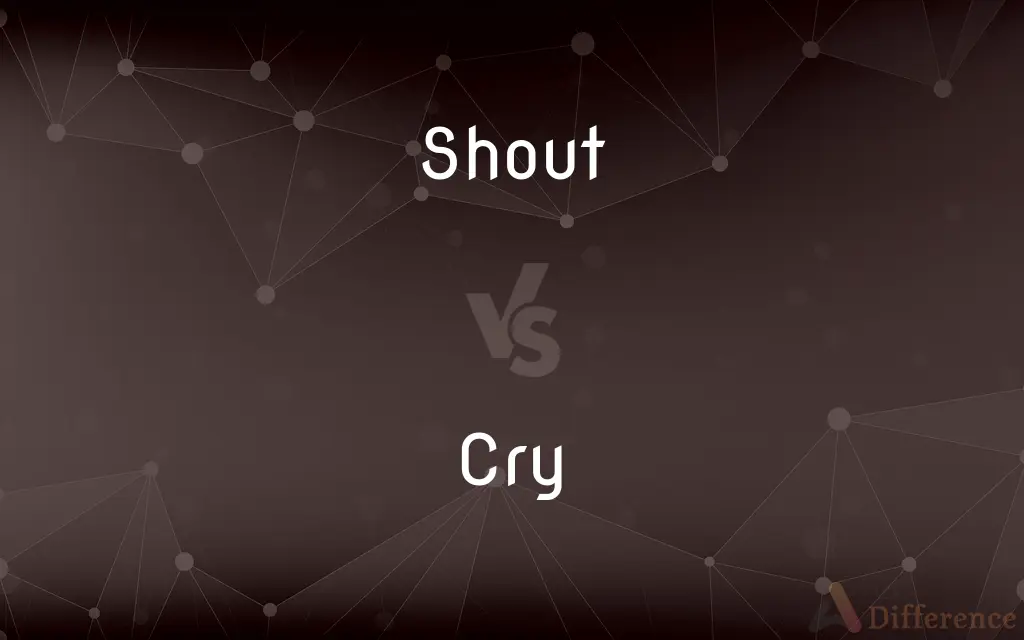Shout vs. Cry — What's the Difference?
By Fiza Rafique & Urooj Arif — Updated on March 14, 2024
Shouting involves raising one's voice loudly, often in anger or excitement, while crying refers to the act of shedding tears, usually due to emotional distress.

Difference Between Shout and Cry
Table of Contents
ADVERTISEMENT
Key Differences
Shouting is typically associated with a loud, forceful vocalization, used to attract attention, express strong emotions, or command. Whereas, crying primarily involves the shedding of tears, often accompanied by sobbing, as a response to emotional states such as sadness, pain, or joy.
In terms of expression, shouting is often seen as an aggressive or assertive act, used in situations ranging from arguments to celebrations. On the other hand, crying is generally viewed as a release of emotions, signifying vulnerability or relief.
Shouting can serve various purposes, including conveying urgency, asserting authority, or venting frustration. Crying, in contrast, is more commonly associated with personal emotional experiences, serving as an outlet for feelings like grief, happiness, or stress.
While shouting is a vocal expression, it can be directed at others or used to make oneself heard in noisy environments. Crying, however, is usually a more personal and internal expression of emotion, though it can also communicate distress or need for comfort to others.
Both shouting and crying are natural human responses, but they engage different emotional and physical reactions. Shouting involves a forceful expulsion of air and sound, while crying engages the tear ducts and can include physical manifestations like a trembling voice or quivering lips.
ADVERTISEMENT
Comparison Chart
Primary Action
Loud vocalization
Shedding tears
Emotional Tone
Anger, excitement, urgency
Sadness, joy, relief
Expression
Aggressive, assertive
Vulnerable, cathartic
Purpose
Attract attention, express strong emotions
Emotional release, signal distress
Physical Reaction
Forceful expulsion of air
Engagement of tear ducts, sobbing
Communication
Often directed at others
More personal, though can seek comfort from others
Compare with Definitions
Shout
Shouting involves raising one's voice to a high volume, often to be heard over a distance.
The coach shouted instructions to the players from the sidelines.
Cry
Crying is the act of shedding tears, often as a response to an emotional state.
After hearing the sad news, she couldn't help but cry.
Shout
It can express a range of emotions, from anger and frustration to excitement and joy.
Fans shouted in excitement as their team scored the winning goal.
Cry
For many, crying has a cathartic effect, helping to relieve emotional tension.
After a long cry, she felt a sense of relief and calm.
Shout
Shouting is often used to catch someone's attention quickly, especially in noisy environments.
The lifeguard shouted to swimmers to warn them of a dangerous current.
Cry
Crying can be a way to seek comfort or express a need for support.
The child cried after falling, seeking comfort from a parent.
Shout
In some contexts, shouting is used to assert authority or command.
The sergeant shouted orders to the recruits during training.
Cry
Crying can communicate distress or pain to others, prompting empathy or assistance.
The patient's cries alerted the nurse to their immediate need for help.
Shout
Shouting can indicate urgency or the need for immediate action.
The firefighter shouted for everyone to evacuate the building immediately.
Cry
It involves a physical response to feelings such as sadness, joy, or frustration.
Overwhelmed with happiness, he cried tears of joy at the birth of his daughter.
Shout
A loud cry.
Cry
Shed tears, typically as an expression of distress, pain, or sorrow
Don't cry—it'll be all right
You'll cry tears of joy
Shout
To say with or utter a shout.
Cry
Shout or scream, typically to express fear, pain, or grief
The little girl fell down and cried for mummy
Shout
A loud burst of voice or voices; a violent and sudden outcry, especially that of a multitude expressing joy, triumph, exultation, anger, or great effort.
Cry
(of a bird or other animal) make a loud characteristic call
The wild birds cried out over the water
Shout
A round of drinks in a pub; the turn to pay the shot or scot; an act of paying for a round of drinks.
Cry
A loud inarticulate shout or scream expressing a powerful feeling or emotion
A cry of despair
Shout
A call-out for an emergency services team.
Cry
The loud characteristic call of a bird or other animal
The harsh cries of magpies
Shout
(informal) A greeting, name-check or other mention, for example on a radio or TV programme.
Shout out
Next up the new single from Beyoncé, but first a shout to Barry Bloggins and his wife Belinda...
Cry
A spell of shedding tears
I still have a cry, sometimes, when I realize that my mother is dead
Shout
(informal) A suggestion; an idea.
Cry
A pack of hounds
He kept a cry of hounds to hunt in the wilderness
Shout
(intransitive) To utter a sudden and loud cry, as in joy, triumph, exultation or anger, or to attract attention, to animate others, etc.
Cry
To shed tears, especially as a result of strong emotion such as grief, sorrow, pain, or joy.
Shout
(transitive) To utter with a shout; to cry; to shout out
They shouted his name to get his attention.
Cry
To call loudly; shout.
Shout
To pay for food, drink or entertainment for others.
Cry
To utter a characteristic sound or call. Used of an animal.
Shout
(Internet) To post a text message (for example, email) in upper case, regarded as the electronic messaging equivalent of oral shouting.
Please don't shout in the chat room.
Cry
To demand or require immediate action or remedy
Grievances crying out for redress.
Shout
To treat with shouts or clamor.
Cry
To utter loudly; call out.
Shout
To utter a sudden and loud outcry, as in joy, triumph, or exultation, or to attract attention, to animate soldiers, etc.
Shouting of the men and women eke.
They shouted thrice: what was the last cry for?
Cry
To proclaim or announce in public
Crying one's wares in the marketplace.
Shout
To entertain with refreshments or the like gratuitously; to treat.
Cry
To bring into a particular condition by weeping
Cry oneself to sleep.
Shout
To utter with a shout; to cry; - sometimes with out; as, to shout, or to shout out, a man's name.
Cry
(Archaic) To beg for; implore
Cry forgiveness.
Shout
To treat with shouts or clamor.
Cry
A loud utterance of an emotion, such as fear, anger, or despair.
Shout
To treat (one) to something; also, to give (something) by way of treating.
Cry
A loud exclamation; a shout or call.
Shout
A loud burst of voice or voices; a vehement and sudden outcry, especially of a multitudes expressing joy, triumph, exultation, or animated courage.
The Rhodians, seeing the enemy turn their backs, gave a great shout in derision.
Cry
A fit of weeping
Had a good long cry.
Shout
A gratuitous entertainment, with refreshments or the like; a treat.
Cry
An urgent entreaty or appeal.
Shout
A loud utterance; often in protest or opposition;
The speaker was interrupted by loud cries from the rear of the audience
Cry
A public or general demand or complaint.
Shout
Utter in a loud voice; talk in a loud voice (usually denoting characteristic manner of speaking);
My grandmother is hard of hearing--you'll have to shout
Cry
A common view or general report.
Shout
Utter a sudden loud cry;
She cried with pain when the doctor inserted the needle
I yelled to her from the window but she couldn't hear me
Cry
An advertising of wares by calling out
Vendors' cries at the fish market.
Shout
Utter aloud; often with surprise, horror, or joy;
`I won!' he exclaimed
`Help!' she cried
`I'm here,' the mother shouted when she saw her child looking lost
Cry
A rallying call or signal
A cry to arms.
Shout
Use foul or abusive language towards;
The actress abused the policeman who gave her a parking ticket
The angry mother shouted at the teacher
Cry
A slogan, especially a political one.
Cry
The characteristic call or utterance of an animal.
Cry
The baying of hounds during the chase.
Cry
A pack of hounds.
Cry
(Obsolete) Clamor; outcry.
Cry
(Obsolete) A public announcement; a proclamation.
Cry
(intransitive) To shed tears; to weep.
That sad movie always makes me cry.
Cry
(transitive) To utter loudly; to call out; to declare publicly.
Cry
(ambitransitive) To shout, scream, yell.
Cry
(intransitive) To utter inarticulate sounds, as animals do.
Cry
(transitive) To cause to do something, or bring to some state, by crying or weeping.
Tonight I’ll cry myself to sleep.
Cry
To make oral and public proclamation of; to notify or advertise by outcry, especially things lost or found, goods to be sold, auctioned, etc.
To cry goods
Cry
Hence, to publish the banns of, as for marriage.
Cry
A shedding of tears; the act of crying.
After we broke up, I retreated to my room for a good cry.
Cry
A shout or scream.
I heard a cry from afar.
Cry
Words shouted or screamed.
A battle cry
Cry
A clamour or outcry.
Cry
(collectively) A group of hounds.
Cry
A pack or company of people.
Cry
(of an animal) A typical sound made by the species in question.
"Woof" is the cry of a dog, while "neigh" is the cry of a horse.
Cry
A desperate or urgent request.
Cry
(obsolete) Common report; gossip.
Cry
To make a loud call or cry; to call or exclaim vehemently or earnestly; to shout; to vociferate; to proclaim; to pray; to implore.
And about the ninth hour, Jesus cried with a loud voice.
Clapping their hands, and crying with loud voice.
Hear the voice of my supplications when I cry unto thee.
The voice of him that crieth in the wilderness, Prepare ye the way of the Lord.
Some cried after him to return.
Cry
To utter lamentations; to lament audibly; to express pain, grief, or distress, by weeping and sobbing; to shed tears; to bawl, as a child.
Ye shall cry for sorrow of heart.
I could find it in my heart to disgrace my man's apparel and to cry like a woman.
Cry
To utter inarticulate sounds, as animals.
The young ravens which cry.
In a cowslip's bell I lieThere I couch when owls do cry.
Cry
To utter loudly; to call out; to shout; to sound abroad; to declare publicly.
All, all, cry shame against ye, yet I 'll speak.
The man . . . ran on,crying, Life! life! Eternal life!
Cry
To cause to do something, or bring to some state, by crying or weeping; as, to cry one's self to sleep.
Cry
To make oral and public proclamation of; to declare publicly; to notify or advertise by outcry, especially things lost or found, goods to be sold, ets.; as, to cry goods, etc.
Love is lost, and thus she cries him.
Cry
To publish the banns of, as for marriage.
I should not be surprised if they were cried in church next Sabbath.
Men of dissolute lives cry down religion, because they would not be under the restraints of it.
Cry
A loud utterance; especially, the inarticulate sound produced by one of the lower animals; as, the cry of hounds; the cry of wolves.
Cry
Outcry; clamor; tumult; popular demand.
Again that cry was found to have been as unreasonable as ever.
Cry
Any expression of grief, distress, etc., accompanied with tears or sobs; a loud sound, uttered in lamentation.
There shall be a great cry throughout all the land.
An infant crying in the night,An infant crying for the light;And with no language but a cry.
Cry
Loud expression of triumph or wonder or of popular acclamation or favor.
The cry went once on thee.
Cry
Importunate supplication.
O, the most piteous cry of the poor souls.
Cry
Public advertisement by outcry; proclamation, as by hawkers of their wares.
The street cries of London.
Cry
Common report; fame.
The cry goes that you shall marry her.
Cry
A word or phrase caught up by a party or faction and repeated for effect; as, the party cry of the Tories.
All now depends upon a good cry.
Cry
A pack of hounds.
A cry more tunableWas never hollaed to, nor cheered with horn.
Cry
A pack or company of persons; - in contempt.
Would not this . . . get me a fellowship in a cry of players?
Cry
The crackling noise made by block tin when it is bent back and forth.
Cry
A loud utterance; often in protest or opposition;
The speaker was interrupted by loud cries from the rear of the audience
Cry
A loud utterance of emotion (especially when inarticulate);
A cry of rage
A yell of pain
Cry
A slogan used to rally support for a cause;
A cry to arms
Our watchword will be `democracy'
Cry
A fit of weeping;
Had a good cry
Cry
The characteristic utterance of an animal;
Animal cries filled the night
Cry
Utter a sudden loud cry;
She cried with pain when the doctor inserted the needle
I yelled to her from the window but she couldn't hear me
Cry
Shed tears because of sadness, rage, or pain;
She cried bitterly when she heard the news of his death
The girl in the wheelchair wept with frustration when she could not get up the stairs
Cry
Utter aloud; often with surprise, horror, or joy;
`I won!' he exclaimed
`Help!' she cried
`I'm here,' the mother shouted when she saw her child looking lost
Cry
Proclaim or announce in public;
Before we had newspapers, a town cryer would cry the news
He cried his merchandise in the market square
Cry
Demand immediate action;
This situation is crying for attention
Cry
Utter a characteristic sound;
The cat was crying
Cry
Bring into a particular state by crying;
The little boy cried himself to sleep
Common Curiosities
Can crying be beneficial?
Yes, crying can have a cathartic effect, helping to relieve emotional stress and tension.
Is shouting always a sign of anger?
No, shouting can also express excitement, urgency, or assertiveness, not just anger.
Do all cultures view crying in the same way?
Cultural perceptions of crying can vary, with some cultures viewing it as a normal expression of emotion and others as a sign of weakness.
Is it appropriate to shout in all situations?
No, shouting is context-dependent; it may be seen as aggressive or inappropriate in certain situations.
Is crying a sign of weakness?
Crying is a natural emotional response and is not inherently a sign of weakness.
Is it possible to cry without emotional distress?
Yes, crying can be triggered by physical factors like irritation of the eyes or extreme happiness.
Can shouting be used positively?
Yes, shouting can be used positively, such as in cheering for a team or to convey enthusiasm.
Can shouting damage your vocal cords?
Prolonged or excessive shouting can strain or damage the vocal cords.
Can shouting be a form of communication?
Yes, shouting can be used to communicate over distances or in loud environments where normal speech wouldn't be effective.
How can one manage excessive shouting or crying?
Managing emotions through techniques like mindfulness, stress management, or seeking professional help can reduce excessive shouting or crying.
Is there a psychological impact of frequent crying?
Frequent crying can be a sign of underlying emotional distress or psychological conditions, requiring attention.
How do animals exhibit behaviors similar to shouting and crying?
Animals may use loud calls or sounds similar to shouting to communicate or assert dominance, but their crying-like behaviors are more about vocalizing distress or need rather than shedding tears.
How do bystanders typically respond to shouting vs. crying?
Responses can vary; shouting might provoke alarm or annoyance, while crying often elicits sympathy or concern.
What role does societal expectation play in expressing emotions like shouting and crying?
Societal norms heavily influence how, where, and when individuals express emotions, with some societies encouraging openness and others promoting restraint.
Share Your Discovery

Previous Comparison
Surely vs. Verily
Next Comparison
Page vs. ThumbAuthor Spotlight
Written by
Fiza RafiqueFiza Rafique is a skilled content writer at AskDifference.com, where she meticulously refines and enhances written pieces. Drawing from her vast editorial expertise, Fiza ensures clarity, accuracy, and precision in every article. Passionate about language, she continually seeks to elevate the quality of content for readers worldwide.
Co-written by
Urooj ArifUrooj is a skilled content writer at Ask Difference, known for her exceptional ability to simplify complex topics into engaging and informative content. With a passion for research and a flair for clear, concise writing, she consistently delivers articles that resonate with our diverse audience.















































